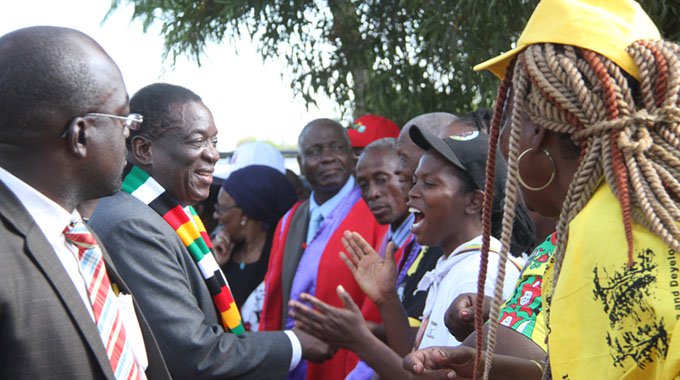A pre-election observer team from the SADC will table before the bloc's regional leaders grievances around Zimbabwe's transition from former president Robert Mugabe's regime to Emmerson Mnangagwa's military-backed administration.
This follows meetings held between the seven-member Sadc Electoral Advisory Council led by Leshele Thohlane and leaders of Zimbabwe's opposition parties.
In his summary of the meetings, Thohlane said the country's opposition parties had made it clear to his team that Mnangagwa ascended to the presidency through a "coup", which government authorities claim was a military intervention with no ingredients of a bloody putsch whatsoever.
"The meeting was clear and the message is that the dispensation (in the country) comes from a clear coup therefore go and tell your principals that we are under military rule and how do you expect legitimate elections under such a dispensation that is the message we got and we will take," he said.
Last week, National Patriotic Front leader Ambrose Mutinhiri also told Thohlane's team that regional bodies should deploy military personnel to observe the forthcoming elections because, as things stand, the ground was still skewed in favour of the ruling party Zanu-PF — which enjoys close ties with the country's security arms — a relationship forged during the country's liberation struggle of the 1970s.
The country's largest opposition party, the MDC, said it will make sure the country will only go to elections after certain benchmarks, including security sector reforms, have been implemented.
Academic and researcher, Ibbo Mandaza, told the Daily News yesterday that Zimbabwe was now under the spotlight as the region and world now look at events leading to Mugabe's fall.
He said Mugabe's interview with foreign and local journalists last week had thrust the country in the spotlight once again.
Mandaza said the tell-all interview was designed to set the agenda for the African Union (AU)'s extraordinary summit on the African Continental Free Trade Area being held in Kigali, Rwanda.
Mnangagwa is currently in Rwanda, attending the summit.
"No one can ignore the fact now that there was a coup. As much as people say that Mugabe's is a case of sour grapes, and even though people were happy to see him go, that does not exonerate a coup," said Mandaza.
"It is hard to expect a free and fair election under the military, the opposition is making bold statements about the current conditions; the question now is what the African Union are going to say in Kigali.
"Mugabe's interview is meant to coincide with (South African president Cyril) Ramaphosa's visit, and it was also meant to coincide with the AU meeting," added Mandaza.
Ramaphosa made a brief stopover in Zimbabwe last week, during which he met with Mnangagwa.
His visit came hard on the heels of Mugabe's interview in which he blamed Sadc for folding its arms while the military intervened in civilian matters and ended his 37-year-old barren rule.
The last time Mnangagwa addressed the AU in Addis Ababa Ethiopia, he was at pains explaining to his peers that "your brother,...Mugabe is safe, secure and well".
But after the disposed leader insisted he was removed through a "coup", the relationship between them is now strained with Zanu-PF functionaries now calling for the former leader's expulsion.
Professor of World Politics at the School of Oriental & African Studies at the University of London in the United Kingdom, Stephen Chan, said the country's opposition cannot count on election observers to force Zanu-PF into reforms.
"All that observers can do is offer encouragement and, if invited to send an observer group, observe the elections.
"No one knows how free and fair these polls will be as no one has really seen a detailed technical breakdown of all stages of the biometric process.
"Both the opposition and the observer groups need to have computer experts on board," said Chan.
He said observers simply observe; they cannot actively apply pressure.
Chan, however, said the more observers there are who are well equipped and prepared, and not "observation tourists", the more governments must take care to be honest.
"However, if there are many groups who are indeed 'observation tourists", that they observe without rigour, then the government can skilfully divide and rule", said Chan who classifies most AU observer groups as "observation tourists".
- Daily News
 Concern over Masvingo black market
Concern over Masvingo black market  Kenya declares three days of mourning for Mugabe
Kenya declares three days of mourning for Mugabe  UK's Boris Johnson quits over Brexit stretegy
UK's Boris Johnson quits over Brexit stretegy  SecZim licences VFEX
SecZim licences VFEX  Zimbabwe abandons debt relief initiative
Zimbabwe abandons debt relief initiative  European Investment Bank warms up to Zimbabwe
European Investment Bank warms up to Zimbabwe  Young Investment Professional (YIP) Graduate Programme 2019
Young Investment Professional (YIP) Graduate Programme 2019 











 Young Investment Professional (YIP) Graduate Programme 2019
Young Investment Professional (YIP) Graduate Programme 2019
Editor's Pick